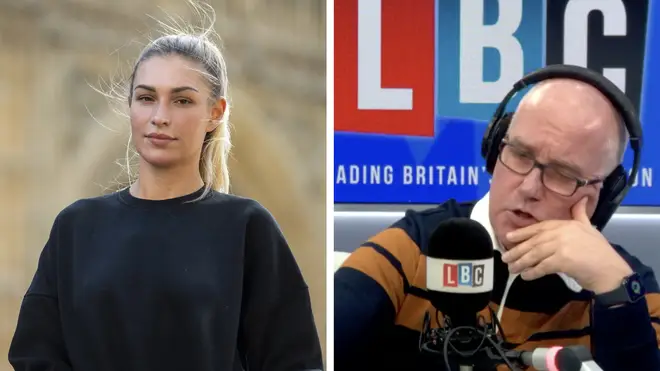
Paul Brand 10am - 12pm
25 February 2021, 19:23

Zara McDermott opens up about being a victim of revenge porn
Love Island star Zara McDermott opened up on LBC about the trauma of being a revenge porn victim at 14 years old, after raising awareness of the "hugely impactful" issue through a documentary.
The reality star said on her documentary that she 'wanted to die' after being a victim of revenge porn.
Revenge porn is the sharing of private sexual materials with intent to cause distress, often carried out by a previous partner.
Ms McDermott shed light on the effects of revenge porn in a documentary, revealing that she has been a victim once when she was 14 and then while in the Love Island villa.
She told Eddie that the incident had a "huge impact on her" and she was even suspended from school - while the perpetrator received no punishment.
Her parents "went through hell and back" as the mother of a fellow school pupil knocked on her family door and told Ms McDermott's mother she should be "so ashamed" of her daughter's "disgusting" behaviour.

She said that doing the documentary she was "blown away" by the amount of unheard revenge porn that there are, after reaching out on Instagram and receiving responses in their droves.
Ms McDermott said the common thread that runs through all the experiences she heard was a feeling of shame and feeling a sense of personal blame.
"The Government has a lot of work to do in the subject area, it's such a grey area," she said, "a lot of the time there isn't necessarily a huge amount of intent. Someone might share someone's images because they might think it's funny, they might think that it'll impress their friends if they share images of a new girl they're speaking to."
Ms McDermott told Eddie there is no law against someone threatening to share images of others which is something she is working on passing in Parliament - currently, legal action can be taken only when something is shared and there is specific evidence to cause distress.
She continued: "What you find is a lot of the time women will go to the police and say my ex-partner's threatening to share these images of me, this video of me...and [officers] say there's not a lot we can do because unfortunately the law says it needs to be shared first in order for us to be able to take action.
"As you can see there are still a huge chunk of people that are missed out."